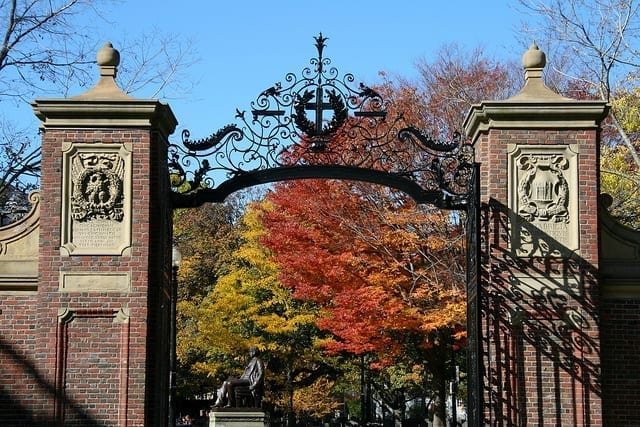The Supreme Judicial Court said that just because the plaintiffs donated to Harvard’s endowment did not mean they had standing to challenge the funds’ use.
A Massachusetts judge has dismissed a lawsuit filed by Harvard University students and alumnus who have demanded the school pull investments in for-profit prison companies.
According to The Harvard Crimson, the ruling effectively brings an end to the lawsuit, which has been argued for the better part of the past year.
The Crimson recounts how the five plaintiffs—several graduate students at the university, along with members of the Harvard Prison Divestment Campaign—alleged that the college had violated its fiduciary duty to management an endowment in good faith by putting money towards private prisons. While past lawsuits had similarly attempted to upturn Harvard’s investments policy, the HPDC took a different stance. In a rather novel line of argument, the plaintiffs alleged that Harvard engaged in false advertising by “pledging to atone for its historical ties to slavery” while financially supporting corporations which make use of forced labor.
A similar lawsuit against Harvard was filed in 2014. In that case, students tried to force the university do divest from the fossil fuel industry.
However, another Massachusetts judge dismissed that lawsuit, too. In its ruling, the court determined that Harvard undergraduate students lacked sufficient standing to challenge the university’s use of endowment funds.
The prison divestment plaintiffs, though, had already prepared a counter—some were Harvard alumni, while others were graduate students. Critically, they all made donations to Harvard prior to filing the lawsuit.
Since their donations would have went towards the university’s general endowment, they were—conceivably—then made stakeholders in the school’s management of the same.

But Massachusetts Supreme Judicial Court Judge Christopher K. Barry-Smith nonetheless determined the plaintiffs lacked standing. In his ruling, Barry-Smith opined that the students and HPDC members failed to prove they should be “accorded a special right in the management or administration of Harvard’s endowment,” despite their donations.
Barry-Smith noted that only the Massachusetts Attorney General has the distinct authority to challenge how a public charity or institution—such as Harvard—manages its assets.
While individuals can obtain “special standing” to challenge the management of charitable assets, they can only claim standing if they possess an interest in an organization that is distinctly different from what may be considered a public interest.
“Contrary to the plaintiffs’ arguments,” Barry-Smith wrote, “there is nothing contained in [cited] statutory framework that confers standing upon donors to sue in contravention of the Legislature’s mandate that the Attorney General has exclusive power and authority to enforce such conduct.”
“The plaintiffs have not alleged that they have conditioned their gifts, an act that could confer such standing, and as such, Harvard is permitted to use their donations as it deems appropriate to advance its charitable purposes.”
The Harvard Crimson notes that, in spite of the unfavorable ruling, plaintiff and HPDC organizer Amanda T. Chan says she will continue fighting the university’s investments in private prisons.
“I only have this to say: the fight continues,” Chain told the Crimson. “Harvard fought well for its right to invest in slavery and to profiteer from the prison-industrial complex, but we won’t back down.”
Sources
Harvard students sue school for divestment from companies profiting off prison industry
Massachusetts Court Dismisses Harvard Prison Divestment Campaign Lawsuit Over University Investments


Join the conversation!